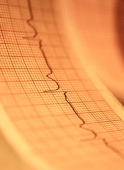- Could Your Grocery Store Meat Be Causing Recurring UTIs?
- Are You Making This Expensive Thermostat Error This Winter?
- Recognizing the Signs of Hypothyroidism
- 10 Strategies to Overcome Insomnia
- Could Artificial Sweeteners Be Aging the Brain Faster?
- Techniques for Soothing Your Nervous System
- Does the Water in Your House Smell Funny? Here’s Why
- Can a Daily Dose of Apple Cider Vinegar Actually Aid Weight Loss?
- 6 Health Beverages That Can Actually Spike Your Blood Sugar
- Treatment Options for Social Anxiety Disorder
Some Breast Cancer Patients May Get Drug-Linked Heart Failure: Study


More than one in 10 older breast cancer patients treated with certain chemotherapy drugs develop heart failure, but many don’t get proper treatment for their heart condition, a new study suggests.
“The majority of older women who develop heart problems after their breast cancer therapy aren’t treated by a cardiologist, and they had lower quality of care,” study lead author Dr. Jersey Chen, a research scientist and cardiologist at Kaiser Permanente in Rockville, Md., said in an American Heart Association news release.
The study was to be presented Tuesday at an American Heart Association meeting in Baltimore.
Chen’s team analyzed Medicare data on 8,400 breast cancer patients older than 65 who were treated either with chemotherapy drugs called anthracyclines, or a targeted therapy called trastuzumab. Prior research has linked both of these treatments to heart problems.
About 12 percent of the patients did develop heart failure within three years after their cancer treatment, but only one-third of them saw a cardiologist within 90 days of developing the symptoms, the study found.
Patients who saw a cardiologist were more likely to receive standard medications for heart failure than those who did not see a cardiologist, the researchers said.
“This suggests that this is an important area for oncologists and cardiologists to collaborate,” Chen added.
Breast cancer patients who’ve been treated with anthracyclines or trastuzumab need to be aware that the therapies can cause heart problems, and “if you have symptoms of heart problems like shortness of breath or swelling in the feet or legs, seek attention quickly, preferably with doctors familiar and comfortable with treating heart failure after cancer therapy,” Chen advised.
People with other types of cancers who are treated with anthracyclines or trastuzumab also need to be alert for heart problems, he added.
Findings presented at medical meetings are typically considered preliminary until published in a peer-reviewed journal.
More information
The U.S. National Cancer Institute has more about breast cancer treatments.
Source: HealthDay
Copyright © 2026 HealthDay. All rights reserved.










